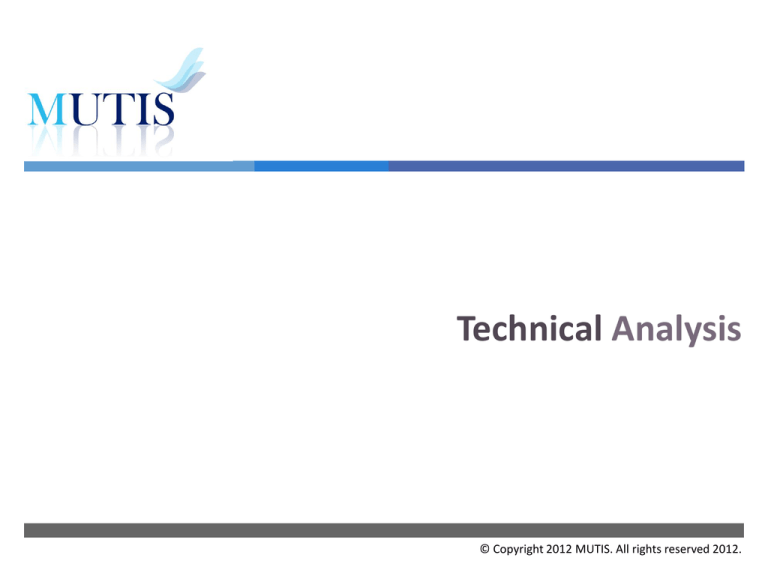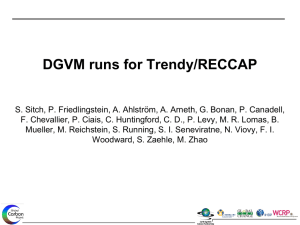
Technical Analysis
© Copyright 2012 MUTIS. All rights reserved 2012.
Disclaimer
The information and material provided at MUTIS is for educational purposes
only and does not constitute financial product advice. The views of the
speakers are their own and not those of MUTIS. MUTIS does not represent
or warrant that the information or material is complete or accurate. You
should consider obtaining independent advice before making any financial
decisions. If you are seeking advice (including a recommendation or opinion)
about a financial product you should consult a certified financial advisor. To
the extent permitted by law, no responsibility for any loss arising in any way
(including by way of negligence) from anyone acting or refraining from acting
as a result of the information or material is accepted by MUTIS
© Copyright 2012 MUTIS. All rights reserved 2012.
Objective
To provide the basic framework of technical analysis so
as to improve financial literacy among our members
and increase participation among the MUTIS
community.
© Copyright 2012 MUTIS. All rights reserved 2012.
Why
Use of historical price action to forecast future price
movements
Value lies in forecasting/anticipation
© Copyright 2012 MUTIS. All rights reserved 2012.
Contents
Types of chart
Support & resistance
© Copyright 2012 MUTIS. All rights reserved 2012.
Types of charts
Line
Bar
Candlestick
© Copyright 2012 MUTIS. All rights reserved 2012.
Line
Connects a single price
Uses only one of the following
Open
High
Low
Mid
Close (DEFAULT)
© Copyright 2012 MUTIS. All rights reserved 2012.
Line
Pros
Gives a simplistic & overall view of price
Line studies are easy to conduct
Cons
Insufficient information
© Copyright 2012 MUTIS. All rights reserved 2012.
Bar
Shows open high low close together
© Copyright 2012 MUTIS. All rights reserved 2012.
Bar
Pros
Has sufficient information
Cons
Messy
© Copyright 2012 MUTIS. All rights reserved 2012.
Candlestick
Has sufficient information
Highly visual
Provides sentiment analysis
Preferred chart for analysis
© Copyright 2012 MUTIS. All rights reserved 2012.
Candlestick
Pros
Highly visual
Provides sentiment analysis
Cons
Increased subjectivity
More information = more analysis
© Copyright 2012 MUTIS. All rights reserved 2012.
Candlestick
Unnecessary to know patterns and names
Patterns are either
Bullish
Bearish
Neutral
© Copyright 2012 MUTIS. All rights reserved 2012.
Support & Resistance
Support
Psychological price level of BUYING
Resistance
Psychological price level of SELLING
Round numbers (e.g. DJIA 10000, SP 1400)
© Copyright 2012 MUTIS. All rights reserved 2012.
Support & Resistance
Reminder
Value is in forecasting/anticipation
Technical analysis always looks good on hindsight
Without anticipation it has no value
Obvious only when it works out
© Copyright 2012 MUTIS. All rights reserved 2012.
Support & Resistance
Resistance can turn into support and vice-versa
Traders wait for the breakout of a range and buy into
the breakout at the former resistance
Sellers are resistance miss out on opportunity
Same with support
© Copyright 2012 MUTIS. All rights reserved 2012.
RESISTANCE
SUPPORT
Contents
Trends
Trend lines
Trend channel
Range
© Copyright 2012 MUTIS. All rights reserved 2012.
Trends
Uptrend
Higher High, Higher Low
Downtrend
Lower High, Lower Low
Swing points
© Copyright 2012 MUTIS. All rights reserved 2012.
14
12
10
8
6
4
2
0
1
2
3
4
5
6
7
8
9
10
11
12
12
10
8
6
4
2
0
1
2
3
4
5
6
7
8
9
10
11
12
Trend Lines
Minimum 2 touch at swing points
Extrapolate to forecast support/resistance
© Copyright 2012 MUTIS. All rights reserved 2012.
Trend Lines
Uptrend
Lines connect the swing lows
Downtrend
Lines connect the swing high
© Copyright 2012 MUTIS. All rights reserved 2012.
Trend Line
Trend lines extrapolated can provide clues to future
support/resistance
Trend lines can and will always be broken in due
time
Broken trend lines indicates a weakening trend
© Copyright 2012 MUTIS. All rights reserved 2012.
Trend Channels
Duplicate the trend line and connect it to the
opposite swing points
Creates a channel that contains price (support &
resistance)
Exceeding the opposite trend line is a sign of
climaxes
© Copyright 2012 MUTIS. All rights reserved 2012.
Trend Channel Overshoots
Range
Also known as SIDEWAYS TREND
It is a type of trend, NOT an uptrend or downtrend
“The market is trending sideways” or “The market is
range bound”
Remember there are 3 types of trend: Up, down,
sideways
© Copyright 2012 MUTIS. All rights reserved 2012.
Range
Usually sandwiched between two price zones
Support & Resistance
Ranges provide opportunities for traders to trade
extremes
Traders also identify a range and anticipate
breakouts to trade
© Copyright 2012 MUTIS. All rights reserved 2012.
Range
Resistance can turn into support and vice-versa
Traders wait for the breakout of a range and buy into
the breakout at the former resistance
Sellers are resistance miss out on opportunity
Same with support
© Copyright 2012 MUTIS. All rights reserved 2012.
Thank You
© Copyright 2012 MUTIS. All rights reserved 2012.







